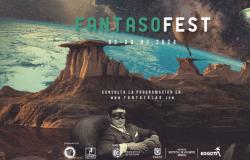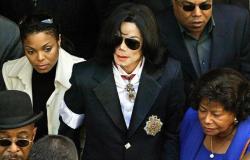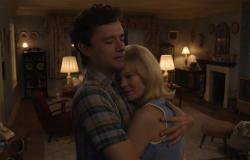
“It makes perfect sense that this interview takes place here, in front of the sea, looking at Morocco,” says Jacqueline Baylon (Chihuahua, 1988) in a café in Tarifa, with her sights set on the coast of the neighboring country, located just over 14 kilometers. This Mexican journalist has just presented her first documentary at the African Film Festival in this city of Cádiz. Until he’s back (Until I return), which describes a little-known aspect of migration: the repatriation of the bodies of those who die trying to reach Spain.
The protagonist of his short film is Ahmed Tchiche, a Moroccan who fights for a year against the endless bureaucracy to be able to recover the mortal remains of his son Yahya, whose body appeared on a beach in Murcia in 2022, with the aim of burying him near his house, in the city of Oudja. “Until he comes back, we won’t be okay,” this father announces in the first minutes of the documentary.
Baylon, who currently lives in Spain, has been researching and writing about migration for years because it is a drama that touches him very closely. At six years old, she crossed the Rio Grande and arrived clandestinely with her mother in El Paso, in the United States, where she grew up. “When you cross a river, the police chase you and they throw you out of a place, even if you are a girl, that marks you forever,” says the director.
Ask. Where did the idea for this documentary come from?
Answer. It all started when reading a profile about Martín Zamora, an embalmer who works in the Algeciras area and who has taken care of dozens of corpses of Moroccan migrants who could not fulfill their dream of arriving in Spain. That care and respect for those who have died caught my attention and I began to watch the documentary. I got the support of Scripps News television, for which I work, and we started filming scenes with him, but keeping in mind that the central theme had to be a family that was looking for a son or a brother because they want to say goodbye.
Q. And how does it reach Yahya’s family?
R. We had contacted NGOs that help families locate their missing loved ones and we were filming in Morocco when three bodies appeared in Murcia, one of them Yahya’s. From there we spent a year accompanying his father. It was a bet, because we didn’t know how it was going to end and if he would manage to repatriate the body of his son. Because they do not always succeed, many deceased migrants end up cremated or buried in Spain. The road for families is full of obstacles.
Q. The drama of the Tchiche family serves to tell the magnitude of the migration crisis in this area.
R. Yes, that is why the images that describe the path to repatriate Yahya’s body alternate with a rescue of a boat with several dozen migrants that we were able to record together with the NGO Open Arms and that I thought was important to show.
Q. Is there any image from the shoot that particularly impacted you?
R. When the family is waiting for the car with the boy’s coffin to arrive at the house so that the women can watch over it for a few hours, there were some young people who were there to say goodbye to the deceased and they talked among themselves about the possibility of secretly getting into the car. the car, which was returning to Spain, and flee. Everyone wants to leave, they think about it all the time, even at a funeral. And while filming I was also surprised by the business of repatriating bodies, which costs about 3,500 euros, an enormous amount for these mostly poor families. With the aggravating factor that the boys who die have already paid between 3,000 and 5,000 euros to get on a boat.
Q. Migration is an issue that you have experienced firsthand because you have also had to leave and start clandestinely and from scratch in another country.
R. All of this touches me very closely. When I was six years old I clandestinely crossed the Rio Grande with my mother. We paid a coyote because she wanted to give me a better life and we arrived in El Paso. Several times we were caught by the immigration police and returned, but all that was before September 11, 2001 and it was easier. You could pay someone $100 and cross again. Now it costs $10,000 to cross that border, it’s crazy.
Q. Since then he has lived in the United States.
R. Yes, when I was nine years old we already legalized my situation. But when you cross a river, the police chase you and they throw you out, even if you are a girl, that marks you forever. I remember one time that the immigration agents were looking for us and several families, and my mother and I hid in a parking lot. My mother started to see if there were any open cars and finally she found one, but there was a woman inside, who panicked when she saw us. I also started crying out of fear and my mother tried to calm us both down so they wouldn’t discover us.
Q. Is there anything from those personal experiences that has been captured in your film?
R. Yes. There or here, in the Strait of Gibraltar, migrants do not always want to leave home. We don’t want to leave friends, family, our customs, our food… but it is done out of necessity and many people forget that.
Q. His documentary premiered in the United States, where it won the award for best documentary short at the Big Sky Documentary Film Festival in Montana. How is the journey going in Europe and specifically in Spain?
R. In the United States it has been very well received, but I am surprised that in Europe, and more specifically in Spain, it has not aroused much interest so far. It has been rejected at several festivals and it surprised me, because it is a story that in my opinion should be known.
Q. Has the Tchiche family seen the film?
R. Yes, they have seen it and felt very respected and represented. It’s what the father wanted and it touched my heart that they allowed us to reach so deep, that they allowed us to record such family moments.
Q. Do you already have another documentary in mind?
R. I would like to tell the story of my Mexican family, who is in Ciudad Juárez, although I still don’t know how. My mother has eight sisters and they are all there. I have some cousins who have been coyotes and I wanted to tell their story: how someone decides to work in this without necessarily being a bad person, just because they have to eat and it is difficult to find a job there.
You can follow Future Planet in x, Facebook, instagram and TikTok and subscribe here to our newsletter.





